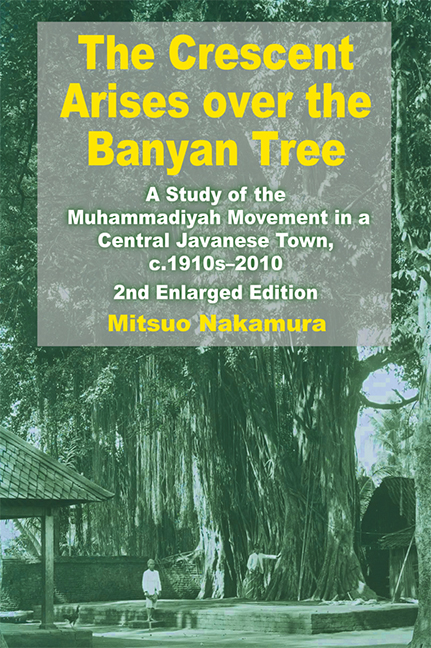 The Crescent Arises over the Banyan Tree
The Crescent Arises over the Banyan Tree Book contents
- Frontmatter
- Dedication
- Epigraph
- Contents
- List of Figures and Maps
- List of Tables
- List of Boxes
- Foreword to the Second Edition
- Preface to the Second Edition
- Foreword to the First Edition
- Preface to the First Edition
- Notes
- Map
- PART I DEVELOPMENT OF THE MUHAMMADIYAH IN KOTAGEDE, c.1910s–1972
- 1 Introduction: The Islamization of Java
- 2 Kotagede under the Banyan Tree: Traditional Society and Religion
- 3 The Beginning of the Muhammadiyah: Court Religious Officials and the Urban Middle Class
- 4 The Development of the Muhammadiyah: Religion and Social Action
- 5 The Sociology of Ummat Islam: Structure and Anti-Structure
- 6 The Ideology of the Muhammadiyah: Tradition and Transformation
- 7 Conclusion: Re-Islamization of Java
- Postscript to Part I
- PART II KOTAGEDE REVISITED, 1972–2010
- Bibliography
- Glossary
- Appendices
- Index
- About the Author
5 - The Sociology of Ummat Islam: Structure and Anti-Structure
from PART I - DEVELOPMENT OF THE MUHAMMADIYAH IN KOTAGEDE, c.1910s–1972
Published online by Cambridge University Press: 21 October 2015
- Frontmatter
- Dedication
- Epigraph
- Contents
- List of Figures and Maps
- List of Tables
- List of Boxes
- Foreword to the Second Edition
- Preface to the Second Edition
- Foreword to the First Edition
- Preface to the First Edition
- Notes
- Map
- PART I DEVELOPMENT OF THE MUHAMMADIYAH IN KOTAGEDE, c.1910s–1972
- 1 Introduction: The Islamization of Java
- 2 Kotagede under the Banyan Tree: Traditional Society and Religion
- 3 The Beginning of the Muhammadiyah: Court Religious Officials and the Urban Middle Class
- 4 The Development of the Muhammadiyah: Religion and Social Action
- 5 The Sociology of Ummat Islam: Structure and Anti-Structure
- 6 The Ideology of the Muhammadiyah: Tradition and Transformation
- 7 Conclusion: Re-Islamization of Java
- Postscript to Part I
- PART II KOTAGEDE REVISITED, 1972–2010
- Bibliography
- Glossary
- Appendices
- Index
- About the Author
Summary
Nowadays anybody can become any kind of person (siapa-siapa bisa menjadi apa-apa saja). The main point is how one behaves; like priyayi (berpriyayi), like santri (bersantri), or like abangan (berabangan). It is ber, ber, ber (“doings”) that makes the difference. (Interview with Kyai Haji Masjhudi, 2 November 1971).
The Muhammadiyah movement was characterized by its non-political stance from the outset as we have seen above (Chapter 3, p. 73). Besides the factor of circumspect avoidance of government repressions of “Muslim fanatics”, the position was a manifestation of the high value placed by the movement on an individual Muslim's personal faith which could uphold self-reliant and independent Muslim life under any political condition. The achievement of religious devotion was regarded as a matter lying within the range of an individual's personal control in whatever situation. A religious community composed of such individuals could transcend any particular forms of secular polity. Throughout the Dutch period, the Muhammadiyah's stance towards the colonial government was rather passive and defensive; if the government interfered with Islamic matters, it certainly reacted to defend its interests with full strength, but otherwise it took no political initiatives of its own. Formation of or affiliation with political organizations was completely left to individual choice. Towards the latter half of the 1930s, an Islamic political party, Partai Islam Indonesia (PII), closely connected with the Muhammadiyah, was formed. However, the party's role was a “diplomatic” representation, i.e., negotiations with the colonial government and other secular political parties for the defence of Islamic interests. The basic non-political position of the Muhammadiyah helped to maintain a stable condition favourable for the steady growth of its membership and the establishment of educational and social welfare institutions.
THE POST-WAR POLITICAL DEVELOPMENT
Conventionally, the history of Indonesian politics in the next two decades (1940s–1950s) has been viewed as a history of the failure of Muslims’ political attempt at making independent Indonesia an Islamic state. Under the Japanese occupation authorities, Muslim political forces acquired organizational strength and a stature in national politics comparable to that of civil servants and secular nationalists.
- Type
- Chapter
- Information
- The Crescent Arises over the Banyan TreeA Study of the Muhammadiyah Movement in a Central Javanese Town, c.1910s-2010 (Second Enlarged Edition), pp. 119 - 164Publisher: ISEAS–Yusof Ishak InstitutePrint publication year: 2012


